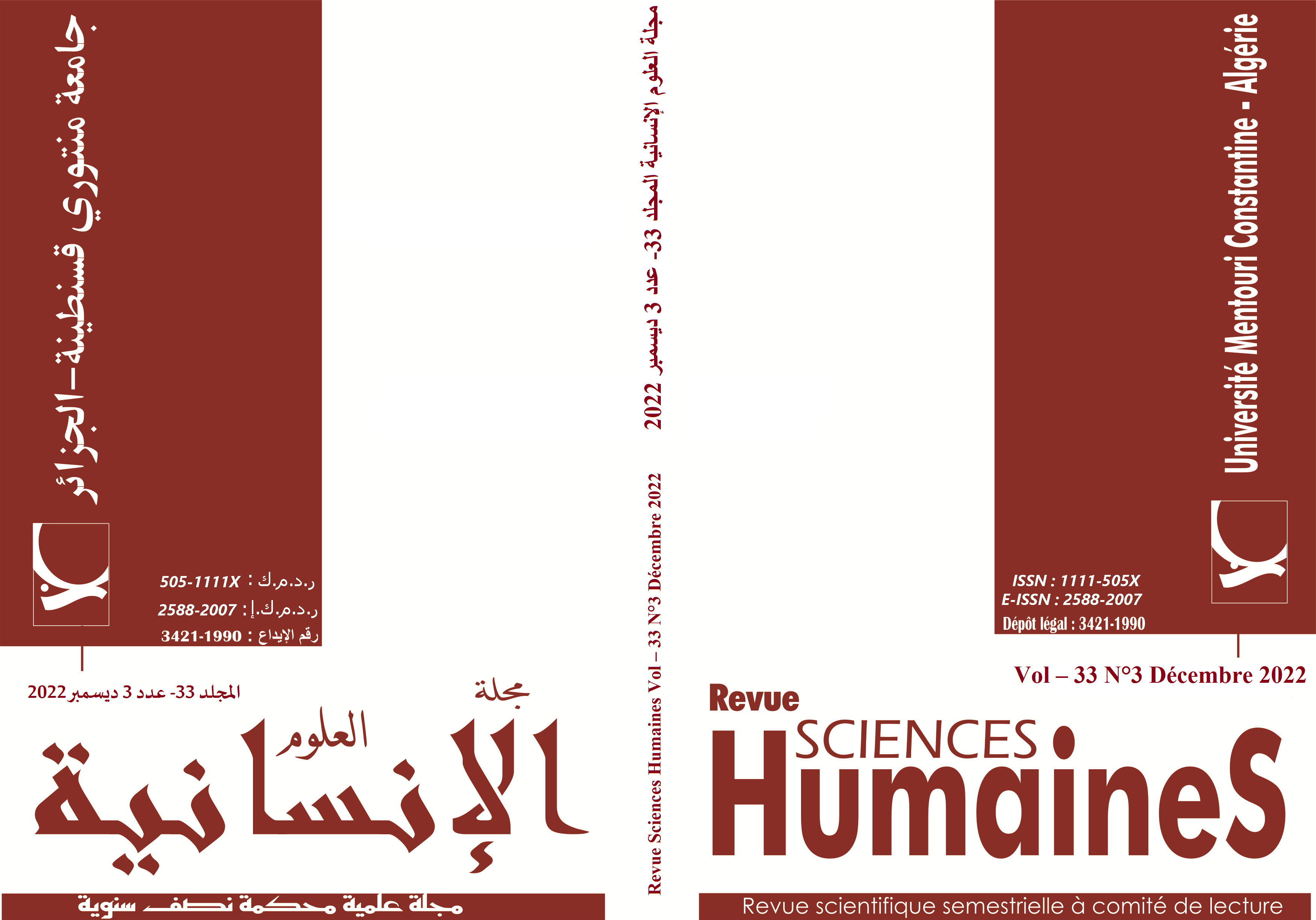Teachers’ Perceptions of the Teaching of Speech Acts and Pragmatics in the EFL Classroom at the Algerian Higher Education Institutions
Mots-clés :
La pragmatique, apprentissage de l’Anglais comme langue étrangère, compétence pragmatique, théorie des actes de parole, enseignement de la pragmatiqueRésumé
La présente recherche vise à étudier les attitudes des enseignants Algériens du supérieur envers l’enseignement de la pragmatique, en général, et des actes de parole, en particulier, en classe d’anglais comme langue étrangère. Plus précisément, elle examine les avis des enseignants vis-à-vis l’enseignement des actes de parole et de l’information pragmatique qui les accompagne. Pour atteindre l'objectif de cette recherche, 39 enseignants ont participé à cette étude et ont répondu à un questionnaire de 25 questions. Les résultats ont révélé que la majorité des enseignants trouvent que l’enseignement des actes de parole et les éléments pragmatiques liées à ces actes est important dans le cadre de l’enseignement de l’anglais ; cependant, quand il s’agit de l’inclusion de ces éléments dans leur classe, ils ne les intègrent pas fréquemment. Donc, davantage d’efforts devraient être faits pour assurer l’enseignement de ces éléments pragmatiques et le développement de la compétence pragmatique des apprenants.
Téléchargements
Références
. Atamna, E. (2008). An ethnography-based culture integrated approach to teaching English at the department of English. Unpublished Doctorate Thesis, Mentouri University, Constantine.
. Austin, J. (1962). How to do things with words. Clarendon, Oxford.
. Bachman, L.F. (1990). Fundamental considerations in language testing. Oxford:
Oxford University Press.
. Bachman, L.F., & Palmer, A.S. (1996). Language Testing in Practice. Oxford: Oxford University Press.
. Bardovi-Harlig, K. (1996). Pragmatics and language teaching: Bringing pragmatics and pedagogy together. In L. F. Bouton (Ed.), Pragmatics and language learning, (Vol. 7, pp. 21-39). University of Illinois, Urbana-Champaign: Division of English as an International Language.
. Bardovi-Harlig, K., & Mahan-Taylor, R. (2003). Teaching pragmatics. Washington DC" Office of English Programs, U.S. Department of State.
. Barron, A. (2003). Acquisition in interlanguage pragmatics: Learning how to do things with words in a study abroad context. Philadelphia: John Benjamins.
. Bouchikhi, F., & Barka, Z. (2017). Higher education in Algeria: Achievements and challenges- 1963 to 2017. UBT International Conference. 115, 45-50.
. Boxer, D., & Pickering, L. (1995). Problems in the presentation of speech acts in ELT materials: The case of complaints. ELT Journal,49,44-58.
. Breen, M., & Candlin, C. N. (1980). The essentials of a communicative curriculum in language teaching. Applied Linguistics, 1, 89-112.
. Brown, P., & Levinson, S. (1987). Politeness: Some universals in language usage. Cambridge: Cambridge University Press.
. Canale, M. (1983). From communicative competence to communicative language pedagogy. In J. C. Richard, & R. W. Schmidt (Eds.), Language and communication (pp. 2-14). London: Longman.
. Canale, M., & Swain, M. (1980). Theoretical bases of communicative approaches to second language teaching and testing. Applied Linguistics, 1, 1-47.
. Chomsky, N. (1965). Aspects of the theory of syntax. Cambridge: MIT Press.
. Cohen, A.D. & Olshtain, E. (1993). The production of speech acts by EFL Learners. TESOL Quarterly, 27, 33-56.
. Crystal, D. (1985). A Dictionary of linguistics and phonetics, 2nd edition. Oxford: Blackwell.
. Douglas, B.H. (2007). Principles of language learning and teaching, fifth Edition. White Plains, NY: Pearson Education.
. Ellis, D. (1994). Codes and pragmatic comprehension (Commentary on Badzinski and Gill). Communication Yearbook, 17, 333-343.
. Holtgraves, T.M. (2002). Language as social action: Social psychology and language use. Mahwah, New Jersey: Lawrence, Erlbaum.
. Hymes, D. (1972). On communicative competence, in Pride, J.B., & Holmes. (eds), Sociolinguistics. Harmondsworth, England: Penguin Books.
. Ishihara, N., & Cohen, A. D (2010). Teaching and learning pragmatics: Where Language and culture meet. Harlow, Essex, England: Longman/Pearson Education.
. Kasper, G., & Rose, K. (2001). Pragmatics in language teaching. New York: Cambridge University Press.
. Leech, G. (1983). Principles of pragmatics. London: Longman.
. Morris, C. (1938). Foundations of the theory of signs. Chicago: University of Chicago Press.
. Morrow, C. (1995). The effect of classroom instruction on ESL learners' production of complaint and refusal speech acts. Paper presented to the Ninth International Conference on Pragmatics and Language Learning. University of Illinois, Urbana.
. Omar, A.S. (1995). Requests in Kiswahili: The performance of native speakers and learners. Paper presented to the Ninth International Conference on Pragmatics and Language Learning. University of Illinois, Urbana.
. Searle, J.R. (1969). Speech acts: An essay in the philosophy of language. Cambridge: Cambridge University Press.
. Searle, J.R. (1979). Expression and meaning: Studies in the theory of speech Acts. Cambridge: Cambridge University Press.
. Searle, J.R., Kiefer, F., & Bierwisch, M. (1980). Introduction. In Searle, J.R., Kiefer, F., & Bierwisch, M. (eds.), Speech act theory and pragmatics. (pp. VII-XII). Dordrecht: Riedel.
. Stalnaker, R. C. (1972). Pragmatics. In D. Davidson & G. Harman (Eds.), Semantics of natural language (pp. 380-397). Dordrecht: Reidel.
. Takenoya, M. (1995b). Effect of gender in acquisition of Japanese. Paper presented to the Ninth International Conference on Pragmatics and Language Learning. University of Illinois, Urbana.
. Vellenga, H.E. (2004). Learning pragmatics from ESL and EFL textbooks: How likely? In TESL- EJ.Vol.8/2, 1-17.
Téléchargements
Publié-e
Comment citer
Numéro
Rubrique
Licence

Cette œuvre est sous licence Creative Commons Attribution - Pas d'Utilisation Commerciale - Pas de Modification 4.0 International.
















